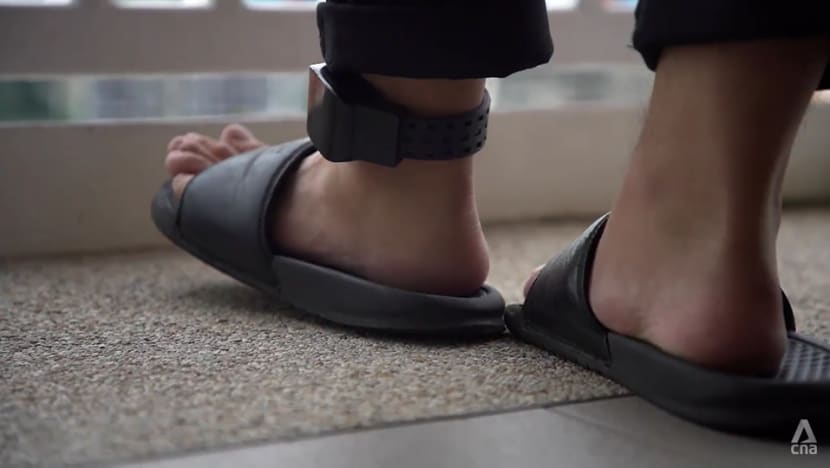Young offenders face more challenges completing probation amid factors like impulsiveness, peer influence: MSF

At least eight in 10 probationers are under the age of 21. Some of them are electronically tagged.
SINGAPORE: Younger offenders tend to face more challenges completing their probation orders due to a range of individual and social factors such as being impulsive and susceptible to peer influence, said the Ministry of Social and Family Development (MSF).
According to an annual report released by the ministry earlier this month, the overall completion rate for probation orders issued by the Youth Court fell for the second year in 2020.
It was 73 per cent in 2018, before dropping to 66 per cent in 2019 and 64 per cent in 2020.
The completion rates were the lowest for those under 16 years old, at 66 per cent last year.
READ: Fewer probation orders issued in 2020 partly due to adjournment of less urgent cases during COVID-19
"Research shows that younger offenders tend to face more challenges in completing their court orders as compared to older offenders," an MSF spokesperson in response to CNA's queries.
"Youths at this stage of development are relatively more impulsive, have a higher need for instant gratification, are susceptible to peer influence and are still developing in their cognitive functioning.
"This could lead them to face more challenges in making sound decisions and thinking through consequences of their behaviours when faced with risky situations."
The ministry noted other factors such as the youth's participation in employment or education.
“Individual factors, such as the youth’s self-control, coping style, engagement in constructive activities such as education or employment, and social competence could also influence the completion of probation orders," it added.
Completion rates for probation orders are also affected by family circumstances, the family’s supervision and involvement in the youth's activities, school or work, said the spokesperson.
READ: ‘I regret committing crime’: Inside the Probation Service and lives of youth offenders
COMPLETION RATES FOR THOSE UNDER 16 YEARS OLD
For offenders under 16 years old who were charged in the Youth Court, MSF said they tend to have "higher risks and needs".
"This may explain the higher complexity of cases that are placed on probation orders by the Youth Court. These youths are likely to have past brushes with the law, associate with peers with pro-criminal behaviours and lifestyles or other risk-taking behaviours that require more intensive intervention," said the spokesperson.
But the number of offenders aged below 16 who were charged has dropped over the years.
“This is partly due to the approach of diverting first-time youth offenders who commit minor offences away from the court, following police investigations,” said MSF, adding that these offenders may instead be required to undergo rehabilitative programmes run by social service agencies.
"This provides the youths the opportunity to be guided in the community without being exposed to the court system," the ministry said.
The majority of those placed on court-ordered probation last year had committed offences related to theft and voluntarily causing hurt. A “small proportion” had been involved in unlicensed moneylending, vandalism and mischief.
COMPLETION RATES FOR YOUTH PROBATIONERS IN HOSTELS
According to the annual probation report, 54 per cent of youth offenders who were required to stay in a hostel had completed their probation in 2020. This is lower than the 72 per cent completion rate for offenders who were not required to stay in a hostel.
When asked why this was the case, MSF noted that only 7 per cent of new probation orders had hostel residence as a probation condition in 2020. The remaining 93 per cent lived with their families, a relative or caregiver.
“Probationers who are placed in hostels would have been assessed to have more complex issues such as limited family support or supervision, family violence, substance abuse, aggression and other risk-taking behaviours, and that supervision at home would be inadequate to help shift their risk of reoffending," said the MSF spokesperson.
“They are more likely to face challenges in complying with their probation conditions given their past unstructured lifestyle and more entrenched offending behaviours. This may see them reacting to the imposition of boundaries, rules and structure and a lack of motivation to change their lifestyle and mindset."
USE OF TECHNOLOGY, ENGAGING FAMILIES
With more complex profiles of offenders, there is a need to better understand the underlying issues that influence offending, said MSF’s spokesperson. These issues include peer pressure, attitudes, beliefs, family relationships and personal motivations.
The ministry found that technology could be used to engage younger offenders and motivate their families.
“Recognising the strong tech-savvy nature of our youth and the prevalence of a gaming culture amongst them, efforts are underway to digitalise two core rehabilitation programmes, Victim Impact and Law and Order, into an ongoing gaming format,” the spokesperson said.
READ: Social workers say early, coordinated help for at-risk youths may be reaping rewards
The Probation and Community Rehabilitation Service is also providing targeted intervention and scaling up the intensity of its programmes. For instance, probationers will go through offence-specific intervention, such as theft intervention or violence prevention, to reduce their likelihood of reoffending.
As family is key in a youth’s rehabilitation, MSF has also adopted family-based approaches and programmes, such as the Functional Family Therapy programme.
Since January last year, authorities have been piloting the Functional Family Probation programme for those under 18. The probationer and the family participate jointly in almost all sessions conducted by the probation officer, and it aims to empower and motivate the family to “take ownership of issues and work at resolving them together”.
“MSF will continue to work with key community partners, such as educational institutions and employers, to strengthen the supportive climate and guidance for youth offenders," said the spokesperson.
"These include efforts to tailor interventions based on the learning needs of these youth offenders, providing them with more opportunities to access resources and mentoring to explore their strengths and develop skills, and increase families’ capacity to support these youths beyond the probation orders."














